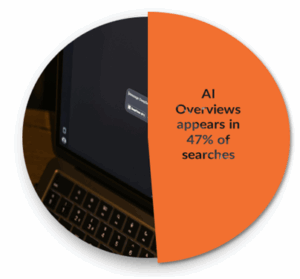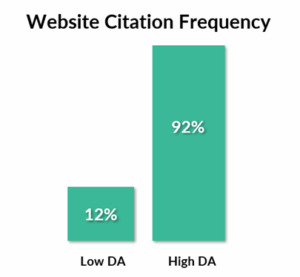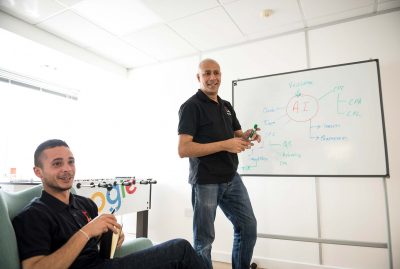There was a time – and it wasn’t that long ago – when search worked in a way we all understood. A person typed a query, scanned the blue links, clicked one, and landed on a website. It was all very polite. Predictable. Linear.
Now, it’s not.
AI has rewritten the script. Google’s AI Overview (AIO) now answers many questions directly, before anyone has a chance to click anything. The search results page has become the destination. The journey ends where it begins.
 According to a Surfer SEO study of over 400,000 search queries, now appear in 47% of Google search results, often replacing the need for users to click at all.
According to a Surfer SEO study of over 400,000 search queries, now appear in 47% of Google search results, often replacing the need for users to click at all.
For users, it’s fast and convenient. For businesses and marketers… well, let’s say it’s a shift. Website traffic from organic search is starting to drop. Fewer clicks. Fewer pageviews. Traditional keyword strategies don’t land the same way. If your brand isn’t part of what the AI decides to surface, you’re suddenly invisible. Some publishers are seeing potential drops between 20% and 60% in search-driven visits, based on internal Google forecasts reported by eMarketer.
But let’s not treat this like the digital apocalypse. This isn’t the end of SEO. It’s the start of a new kind of visibility. In fact, for brands who adapt early, it’s a real opportunity to gain ground while others are still writing blog posts for 2018.
Here’s what matters now:
- Optimise for AI-first search
Google’s AI draws heavily on structured data. That means clean, semantic HTML code and consistent metadata aren’t optional anymore, they’re the price of admission. Schema markup can help, especially where structured data isn’t easily identifiable by the LLM. If your content is authoritative, well-organised, and easy to interpret, you’re far more likely to appear in the AI-generated answers. And since fewer links are being shown, visibility here is more valuable than ever. Content that’s clean, authoritative, and easy to parse is more likely to be featured.
- Write like a human (because the AI prefers it)
AI systems are trained on natural language, how people actually speak and write, not how marketers used to. So, while keyword targeting still has a place, content should now be genuinely conversational. Think FAQs, how-to guides, and answers to real questions in a straightforward tone. If your content sounds like it belongs in a helpful chat, it’s far more likely to be surfaced.
- Be the source AI wants to quote
AI tools pull from sources they trust. That means your credibility, domain authority, backlinks, technical performance, even things like consistency and clarity — directly affects how often your brand gets referenced in these generated responses. Build your reputation like it’s 2005 again. Be reliable. Be useful. And, ideally, be everywhere.
 Sites with higher domain authority and consistent content updates are cited up to 80% more frequently in AI answers, according to a report by Moz.
Sites with higher domain authority and consistent content updates are cited up to 80% more frequently in AI answers, according to a report by Moz.
Yes, the rules are changing. But that’s always been part of the game. Search has never stayed still, and while this leap feels big, it’s also exciting. Less about chasing algorithms, more about building value that gets noticed by both machines and humans.
The brands that embrace this new landscape – that treat AI not as a threat, but as the new lens through which discovery happens, are the ones that will come out ahead. Not just more visible, but more relevant.
So yes, fewer clicks may be coming. But for those who adapt, the clicks that do happen will come from people already primed with information, ready to act, and far more likely to convert.
It’s not the end of search. It’s just a new kind of beginning.
So where do you go from here? Start with an audit, not just of your SEO strategy, but of your content’s clarity, structure, and real-world usefulness. Revisit your HTML and implement schema. Reframe your writing voice. Look at where your brand shows up in AI-generated results (if it does at all), and adjust accordingly. This isn’t about chasing hacks; it’s about showing up in the places that matter, in the format machines can understand and people can trust. The search landscape may be shifting, but the direction is clear: useful, credible, and human content wins.
Generative Engine Optimisation is still new territory for many businesses – but that’s exactly where we come in. At AccuraCast, we help brands like yours get found and featured in AI-generated answers, summaries, and search results.
Whether you’re looking to boost visibility, stay ahead of the curve, or just make sense of where to start, we’re here to help. Explore our GEO services to see how we can support your growth in this new era of search.
About the Author
Stefano is a digital marketing consultant at AccuraCast, in charge of developing and executing effective digital marketing strategies to help clients achieve their business goals. His specialities include analysing data, digital strategy planning and teamwork.












